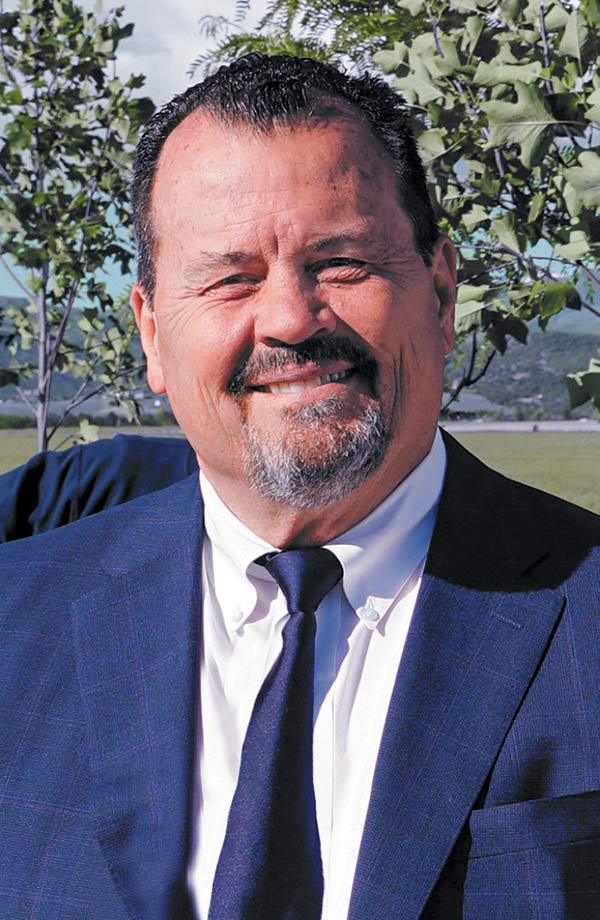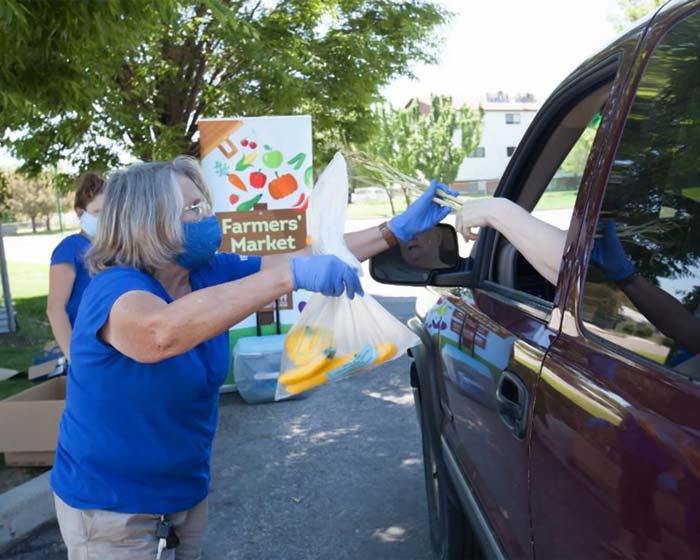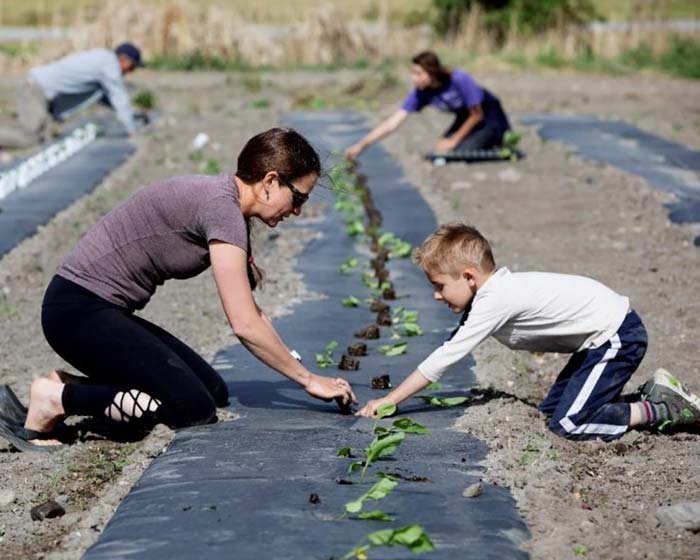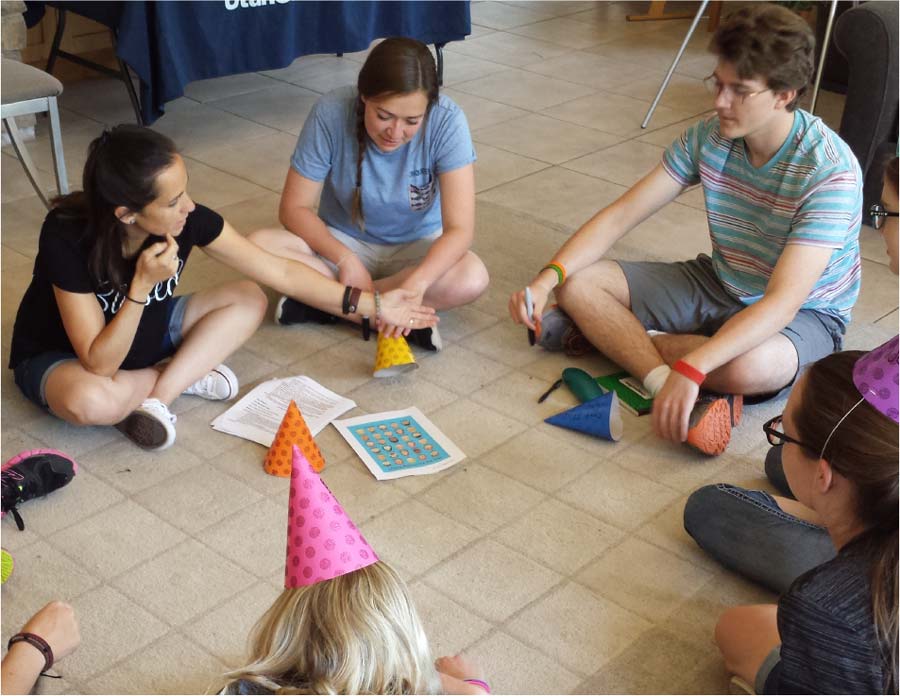Outcomes & Impact Quarterly
Spring Issue 2021
Introduction

USU Extension professionals are working every day in Utah, and we have not stopped or slowed our services through the COVID-19 pandemic. Our more than 140 faculty and experts, strategically located throughout the state, were nimble and worked diligently to provide meaningful programming through these extraordinary times.
Through social media, email, websites and more, we provided the home, family, finance, and health and wellness information people needed. We are so proud of the food distribution programs we provided as well as the traditional education areas we have been able to maintain. Extension has pivoted quickly to meet the needs of youth, many who have struggled with feeling disconnected from their peers, impacting their mental health. Demand for our agriculture, horticulture and related programming has increased ten-fold, and we have met that need with virtual field days, social media connections, and YouTube videos. Our award-winning Rural Online Initiative became even more relevant and expanded its reach to include those in our urban areas struggling with job loss due to COVID-19.
We will continue to serve the people of Utah both virtually and face-to-face now and in the future. We are proud of the impacts we are having and the programming we provide to improve the lives of Utahns.
Finally, we are thrilled to launch this new publication Outcomes & Impacts Quarterly. Throughout the year we will collect the impactful and inspiring stories demonstrating the essential work USU Extension provides to our local communities and provide it to you in this newsletter format. Please read on below for a selection of highlighted programming in this inaugural issue of Outcomes & Impacts Quarterly.
Sincerely,
Kenneth L. White
Dean, College of Agriculture and Applied Sciences; Vice President, Extension and Agriculture

Garden Produce Provided to Food-Insecure Seniors
Katherine Wagner


Approximately 5.3 million seniors, or 7.3% of the national senior population, were food insecure in 2018. In Salt Lake County, seniors comprise approximately 10% of the population. In response, Salt Lake County Master Gardeners grew and disseminated garden produce to seniors at risk of food insecurity during free farmers markets at senior centers. The primary audience for this program was low-income and food-insecure seniors. By targeting high-risk senior centers, the program was able to routinely restock center pantries with fresh and nutritious produce.
- 5.3 million seniors were food insecure in 2018.
- 7.3% of the national senior population was food insecure in 2018.
- 10% of the population in Salt County are seniors.
- ~10,000 LBS of garden produce were disseminated to food insecure seniors, with an estimated market value of $23,000.
- 2,500 seniors collected fresh produce during 40 free farmers markets held outside 7 senior centers.
The Future of Land Owners and the Food Supply
Joshua Dallin, Jacob Hadfield, Matthew D. Garcia, Ryan Larsen

The average age of farmers and ranchers in Utah is 58.7 years old. This explains why Utah farm and ranch producers have listed succession planning as one of the most important programs needed from USU Extension.
Because farmers and ranchers are often unfamiliar with the transition process and its unique challenges, USU Extension has leveraged resources developed by other states to form a farm succession program. The program offers educational training, tools, and strategies for Utah farm and ranch producers to help them create their own unique succession plans pertaining to business, retirement, transition, and estate planning at a pace that is comfortable to them. The workbook tool, when completed, also offers significant financial savings to the producer. In addition, USU Extension developed a team that includes a beef specialist, farm management specialist, and two county-level Extension faculty. The combined skillset of the team and their relationship with producers contribute to the program’s effectiveness.
Workshop Survey Responses:






Online Relationship Education and Its Effect on In-Person Relationships
Brian Higginbotham, Joshua Turner, Kay Bradford

Healthy Relationships Utah (HRU), a USU Extension initiative, provides statewide, grant-funded relationship education programs for youth, adults, and families. Programs have been offered in-person in partnership with high schools, state agencies, jails, and community agencies. Due to COVID-19, the Healthy Relationships Utah initiative transitioned from in-person to virtual classes.
Virtual classes mirrored in-person classes in terms of content, group format, and scheduling.
Outcomes were largely positive, with few differences found between in-person and virtual formats. Results point to the potential for increased accessibility for relationship education through dual-delivery formats.
Data showed no significant differences in program outcomes by format.
Participants in both in-person and virtual classes reported benefits on targeted outcomes related to:
- relationship knowledge
- boundaries
- warning signs
- decision-making
- confidence
Rural Online Initiative Supports COVID-19 Changes
Amanda D. Ali, Paul Hill


USU Extension created a hybrid educational program to address the barriers to participation in the CPSS trainings before and during COVID-19. Extension county faculty acquired grant funding and worked with state specialists, community representatives, and CPSS trainers to adapt the curriculum and develop evaluation measures.
Course participants responded:


Follow-up surveys reported:


- With respect to environmental impacts, reduced commute times equated to savings of $997/month across all participants who found remote work due to lower fuel expenses.
- This further resulted in a total reduction of 3.34 metric tons of carbon emissions per month which helps promote clean air.
Transforming a Mental Health Camp from Hands-on to Virtual Learning
Zurishaddai Garcia

A 2019 Utah Youth Risk Behavior Survey showed that 37% of youth felt sad or hopeless, and 22% had seriously considered suicide. The virtual Camp Thrive program was developed to teach mental health awareness to improve personal resilience. Due to the COVID-19 pandemic, a virtual version of the Davis County annual camp was developed and implemented.
Youth interns were hired to guide the transition process. Two sessions of Camp Thrive were held in July and August of 2020. In total, 37 youth registered for the camp, and youth from 13 counties participated – a silver lining in hard times.
2020 Camp Thrive Results:
- 2 sessions in July and August.
- 37 youth participants.
- 13 counties with participants.
2019 Utah Youth Risk Behavior Survey Results:






 Utah 4-H & Youth
Utah 4-H & Youth